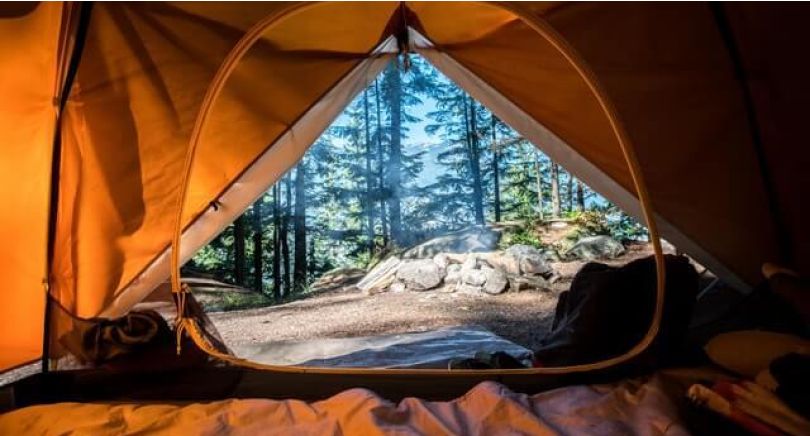Plan A Camping Trip: 5 Things To Do

So you've decided to go camping. What a fantastic idea! Camping is a fun, healthful, and reasonably priced way to connect with nature. You get to turn off the screens, get away from the rush and bustle of city life, and reconnect with nature by eating and sleeping under the stars.
This article will show you how to organize a camping trip and provide tips for having a successful – and pleasurable – journey beneath the stars.
1. Make A Decision About Where You Wish To Go
Knowing where you want to go camping necessitates determining the type of camping you want to do. Backpacking entails carrying everything on your back and hiking into a distant location, whereas car camping entails loading up the car and driving to a paid campsite. There's also RV and pop-up camping if you don't want to put up a tent.
The more minimalist – and daring – approach will be backpacking. Because you can only bring what you can carry, you'll need a sturdy backpack, some lightweight gear (such as a one-person tent), and some knowledge of outdoor safety and navigation. You'll also want to be prepared for no amenities that you don't bring.
If you'd rather stay in a constructed campground with amenities such as toilets and picnic tables, you can drive in, which means you're not limited in what you can bring. It won't be as raw and wild – you'll almost probably be sharing campgrounds with other people – but it will be a nice way to ease into camping.
Camping in a campervan or RV also opens up a world of possibilities. The biggest advantage is that there is no need to set up camp. You can simply park and sleep once you arrive. But there's also the issue of obtaining a legal parking spot. You'll want to check ahead of time to see whether any campgrounds accept RVs so you don't end yourself camping in a truck driver's rest stop. On that subject, if you're camping in a tent and want to enjoy a peaceful night, choose a park that doesn't accept RVs so you don't have to listen to the hum of generators and motors all night.
2. Book Your Campground
If you've chosen a developed campground, don't expect to be able to walk in and get a spot. Camping is becoming increasingly popular, and constructed campgrounds are particularly popular with families during the summer months. Campsites in National Parks can be requested up to a year in advance, and competition for a spot can be severe. To avoid disappointment, make sure you've reserved your campsite ahead of time; otherwise, you can end up spending the evening traveling about seeking a spot to sleep.
Although you cannot make a reservation for wild camping, you should investigate the location where you intend to pitch your tent to ensure that it is permitted — not all public land is open to the public.
3. Do Some Research On Your Intended Destination
When you've determined where you want to go, do some research on the campground and the surrounding area. This can include dull information such as what amenities are available and whether or not bear lockers are available, as well as more exciting information such as what activities are available nearby. This will help you make sure you've packed everything you'll need since you won't be able to use the internet to search up things like nearby food stores and hiking trails after you arrive.
4. Make A Meal Plan
One of the most enjoyable aspects of camping is meal preparation. You'll need to rely on cold, ready-to-eat food or have a lightweight camping stove if you're planning backpacking meals. You'll be able to enjoy a hot dinner and possibly even coffee with the best camping stoves, but you'll still want to bring light, quick dishes like freeze-dried meals, packed tuna, and boxed noodles.
Your menu might be much more diversified whether you camp in a car or a van. You can bring frying pans to use over the fire or a BBQ grill in addition to a larger double-burner camping stove. You can even slice and dice vegetables to go in your meals if there are picnic tables available or if you bring a folding table. When it comes to perishable foods like meat and vegetables, however, keep in mind that how much ice you have in your cooler is a factor. You might be able to find a campsite that sells ice, but if not, make sure to eat any perishable foods first before switching to non-perishables.
5. Be Ready For Any Type Of Weather
Although you can't change the weather, you can prepare for it. The problem with getting soaked while camping is that there's no way to dry off. Wet clothes inside your tent indicate damp, uncomfortable conditions, and if you're sleeping in a down sleeping bag, you can be in for a chilly night. Regardless of the weather prediction, the most crucial item to have is a waterproof jacket. These are small and lightweight, yet they will keep your underwear dry and your body warm. If you're anticipating a lot of rain, you'll also want to think about waterproof trousers and shoes.
Even in hot desert places, temperatures can drop dramatically overnight, so bring base layers that pack down tiny but provide plenty of warmth, as well as one warmer upper layer, such as a fleece that can also serve as a cushion.
If you're going vehicle camping, bring a tarp or pop-up tent to protect yourself from the weather. If the weather is a little too nice, these also give good sun cover.












